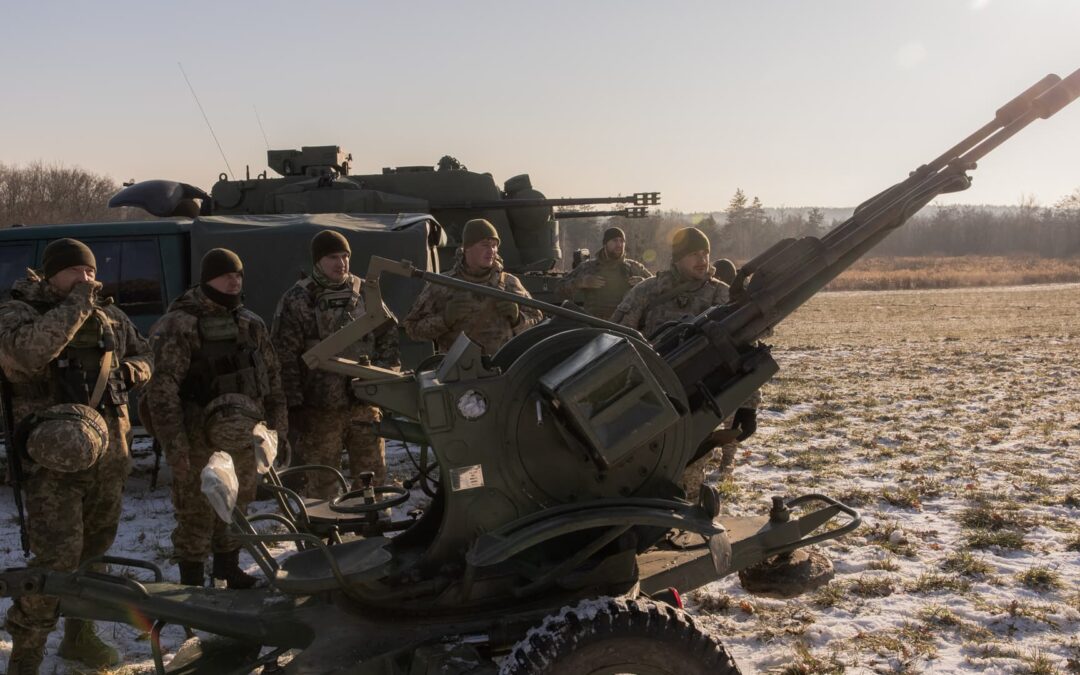Zelenskyy urges faster fortification of frontline areas
Ukrainian President Volodymyr Zelenskyy on Thursday called for quicker fortifications in key battlegrounds that face assaults from Russian forces, particularly in eastern Ukraine.
“In all major sectors, we need to boost and accelerate the construction of structures,” Zelenskyy said in his nightly address, according to a translation, after touring Ukrainian positions in the northeast that have been trying to repel recent Russian advances and recapture certain areas.
In particular, he cited the need for stronger defenses in Avdiivka, Maryinka and in other parts of the Donetsk region, along with various defensive lines in the Kharkiv and Kherson areas.
– Elliot Smith
Ukraine shoots down 18 Russian drones; Russia destroys navy vessel without crew
The Ukrainian air force said on its Telegram channel on Friday that it shot down 18 out of 25 attack drones launched from Russia towards eastern and southern Ukraine overnight, along with one of two guided cruise missiles.
In a Google-translated report, Russia’s navy said early Friday morning that it destroyed a Ukrainian navy vessel without crew that was heading towards Crimea, which Russia annexed in 2014.
CNBC was not able to independently verify each side’s claims.
– Elliot Smith
Germany’s Scholz stresses ‘unwavering solidarity’ with Ukraine on call with Zelenskyy
German Chancellor Olaf Scholz discussed the latest political, military and humanitarian situation in Ukraine in a phone call with Volodymyr Zelenskyy on Thursday, the German government said in a statement.
Scholz told the Ukrainian president that Germany would continue to support Ukraine along with European and international partners.
Scholz also reiterated Germany’s “ongoing and unwavering solidarity” with Ukraine and said that its “future lies in the European Union,” according to the statement.
Zelenskyy discussed recent Russian attacks on Ukrainian civil energy infrastructure and thanked Germany for its military support.
— Jenni Reid
Top Russian court bans LGBT movement as ‘extremist’
Russia’s Supreme Court ruled on Thursday that LGBT activists should be designated as extremists, in a move that representatives of gay and transgender people fear will lead to arrests and prosecutions.
A Reuters reporter in court heard it announce that it had approved a request from the justice ministry to recognise what it called “the international LGBT social movement” as extremist and to ban its activities.
The move is part of a pattern of increasing restrictions in Russia on expressions of sexual orientation and gender identity, including laws outlawing the promotion of “non-traditional” sexual relations and banning legal or medical changes of gender.
TOPSHOT – LGBT activists take part in a May Day rally in Saint Petersburg on May 1, 2018. (Photo by OLGA MALTSEVA / AFP) (Photo by OLGA MALTSEVA/AFP via Getty Images)
Olga Maltseva | Afp | Getty Images
President Vladimir Putin, expected shortly to announce that he will seek a new six-year term in March, has long sought to promote an image of Russia as a guardian of traditional moral values in contrast with a decadent West.
In a speech last year, he said the West was welcome to adopt “rather strange, in my view, new-fangled trends like dozens of genders, and gay parades” but had no right to impose them on other countries.
Putin’s spokesman Dmitry Peskov told reporters before the court decision was announced that the Kremlin was “not following” the case and had no comment on it. The Supreme Court took around five hours to issue its ruling, after opening its session at 10 a.m. local time.
— Reuters
Lavrov tells the OSCE it’s ‘on the brink of an abyss’
SKOPJE, NORTH MACEDONIA – NOVEMBER 30: Russian Foreign Minister Sergey Lavrov attends the 30th Ministerial Council of the Organization for Security and Co-operation in Europe (OSCE) in Skopje, North Macedonia on November 30, 2023. (Photo by Umeys Sulejman/Anadolu via Getty Images)
Anadolu | Anadolu | Getty Images
Russian Foreign Minister Sergei Lavrov told a meeting of the Organization for Security and Co-operation in Europe (OSCE) on Thursday that the group was “on the brink of an abyss.”
Attending the OSCE’s latest meeting in Skopje, North Macedonia, Lavrov accused the 57-member security-oriented organization that it was “essentially being turned into an appendage of NATO and the European Union.”
“The organization, let’s admit it frankly, is on the brink of an abyss,” he said, according to comments reported by Interfax.
“A simple question arises: does it make sense to invest efforts in reviving it?,” he asked, questioning the equality of member countries and approach to regional security problems.
So far, he said, “there are many more questions than answers.”
“But in the meantime, life does not stand still, the processes of Eurasian integration and equal cooperation based on an honest balance of interests are developing on our continent in constructive formats, regardless of the OSCE’s ever deeper immersion in the imposed confrontational agenda,” Lavrov said.
Ukraine and the Baltic nations boycotted this year’s OSCE meeting because of Lavrov’s attendance. The OSCE has also largely been hamstrung when it comes to decision-making because Russia has used its vetoes to thwart the process, putting its future into question.
— Holly Ellyatt









